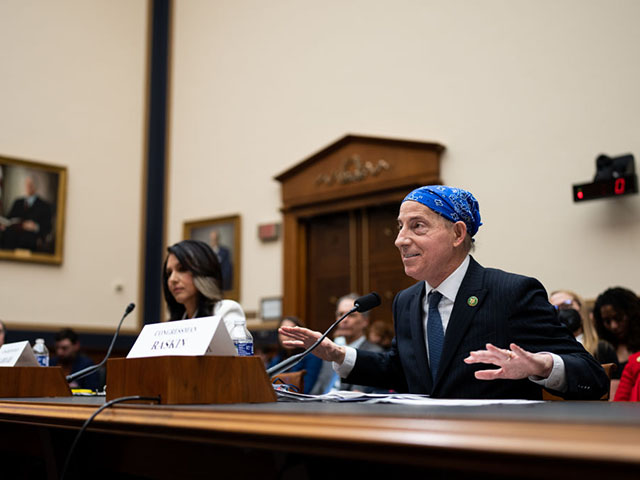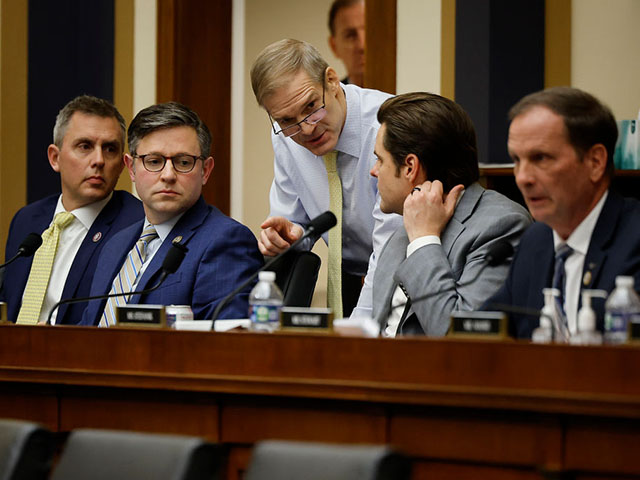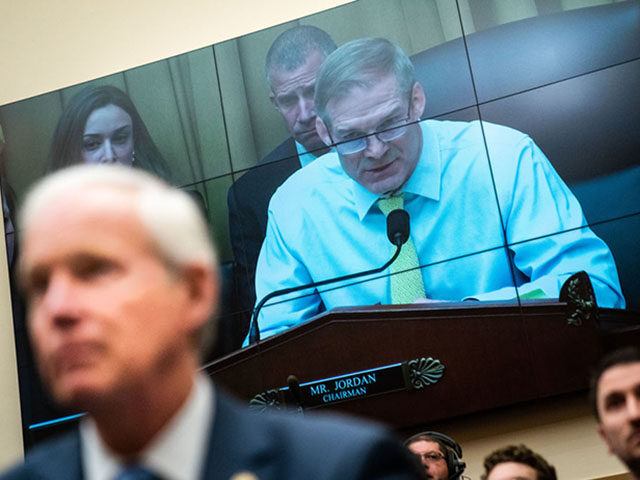The first hearing of the Select Subcommittee on the Weaponization of the Federal Government on Thursday demonstrated the magnitude of the panel’s investigation into alleged civil liberties violations by government agencies.
The inaugural hearing included testimonies from notable members of Congress and former FBI agents, who touched on the surface of a vast number of issues spanning at least three presidential administrations and several agencies, including the Departments of Justice, Education, and Homeland Security, as well as Health and Human Services, the IRS, FBI, CIA, and more.
“This first hearing was just designed to show the gravity and the breadth of the problem, and I think our members and our witnesses did a good job of showing that,” subcommittee chair Rep. Jim Jordan (R-OH) told Breitbart News after the hearing.
Sen. Chuck Grassley (R-IA), who has served in the Senate for more than 40 years, pointed during his testimony to Crossfire Hurricane and the Biden family’s business dealings as instances of government weaponization.
It sounds like “some fiction spy thriller,” Grassley said.
“I’ve never seen so much effort from the FBI, partisan media, and some of my Democratic colleagues to interfere with and undermine very legitimate congressional inquiries,” Grassley said. “It’s become a triad of disinformation and outright falsehoods.”
Sen. Ron Johnson (R-WI) observed the federal government’s enforcement of coronavirus mandates.
“The loss of basic freedoms has been nothing less than breathtaking,” Johnson said.
Rep. Tulsi Gabbard, a longtime Army Reserve officer and Fox News contributor who recently left the Democrat Party, highlighted the now-dissolved Disinformation Governance Board.
Democrats at the hearing, however, largely conveyed skepticism about the subcommittee’s purpose.
One of the Democrats’ two witnesses, Rep. Jamie Raskin (D-MD), contended the subcommittee was “political” because it had an “overriding electoral focus.”

Rep. Jamie Raskin testifies during the weaponization subcommittee hearing in Washington on Thursday, February 9, 2023. (Bill Clark/CQ-Roll Call, Inc via Getty Images)
Raskin, a skilled speaker with an extensive legal background, has long targeted former President Donald Trump, leading the second impeachment case against Trump as well as serving on the January 6 select committee, which centered heavily around the former president.
Raskin used comments Jordan, a fervent Trump supporter, made at a conservative conference last year as his evidence of the subcommittee’s “electoral focus.”
During the conference, Jordan had detailed a host of issues he was interested in probing. He had then added as an aside to the conference’s Trump-friendly audience, “Plus, that will help frame up the 2024 race, when I hope and I think President Trump is going to run again, and we need to make sure that he wins.”
Raskin charged that Jordan “gave the game away entirely” with that one side remark.
Rep. Stacey Plaskett (D-U.S. Virgin Islands), the subcommittee ranking member and a former prosecutor, likewise zeroed in on Trump, warning Republicans’ investigative pursuits could “potentially muck up” ongoing investigations into Trump.
Plaskett, like Raskin, served as a manager in the second impeachment against Trump.
Other witnesses included conservative attorney and professor Jonathan Turley, former FBI agents Thomas Baker and Nicole Parker, and the Democrats’ other witness, Elliot Williams, a CNN legal analyst and former deputy assistant attorney general in the Obama administration.
The hearing, a nearly four-hour affair, was mostly calm as the 21 members questioned witnesses, but a few tense moments peppered the afternoon.
Rep. Dan Goldman (D-NY), a much-hyped freshman member of Congress, Levi Strauss heir, and former attorney in the impeachments against Trump, interrupted the hearing at one point to challenge Jordan on the many FBI whistleblower allegations Jordan has referenced in exhaustive detail over the past year and that were brought up during the hearing.
“There have been a lot of mention of information and testimony that you all have received from whistleblowers. When are you planning on providing that to the minority?” Goldman asked. “You talk about dozens of whistleblowers. When are we going to get that information?”
Jordan noted Democrats on the Judiciary Committee, under which the subcommittee is housed, have been and will continue to be invited to transcribed interviews of whistleblowers, though Goldman countered that he personally had not been made aware of the transcribed interviews that had already taken place nor had he been privy to the “dozens” of other whistleblower accounts that were broached during the hearing.
Rep. Matt Gaetz (R-FL) later formally entered into the congressional record a 1,000-plus page FBI whistleblower report Jordan publicly released in November. Gaetz asked specifically that Goldman receive a copy.

House Judiciary Committee chairman Jim Jordan talks with fellow Weaponization of the Federal Government Subcommittee members during their first hearing, February 9, 2023 in Washington, DC. (Chip Somodevilla/Getty Images)
At one point, Rep. Debbie Wasserman Shultz (D-FL) sought to discredit Turley, who had opined in his capacity as a witness on the Twitter files.
“Do you have any specific or special or unique knowledge about the inner workings of Twitter?” Wasserman Shultz asked. “So essentially your responses to the questions here today were your own opinion and pure conjecture?”
Rep. Darrell Issa (R-CA), who spoke after Wasserman Shultz, noted Turley has long been widely considered an “expert witness” on Constitutional analysis.
“How many times have you testified before Congress on behalf of all of us, dozens and dozens and dozens over my 22 years?” Issa asked Turley.
“I’ve testified both as a Republican and Democrat witness over 50 times, approaching 60,” Turley replied.
Rep. Colin Allred (D-TX) used part of his speaking time to denounce the multi-topic hearing for going “so far down the rabbit hole.”
An Issa spokesman, by contrast, told Breitbart News he believed the hearing was successful in that members “realized the sheer enormity of the problem and what it’s going to take to address it legislatively.”
Jordan said he thought the witnesses were “great in framing up how serious this is.”
The chairman commended fellow members, including Rep. Dan Bishop (R-NC), who spoke on the Twitter files, and Rep. Mike Johnson (R-LA), who gave a step-by-step timeline on the FBI’s involvement with school board activity, for the “context” they provided on “how big and serious” the subcommittee’s purpose was.
Asked about next steps, Jordan said he expects the subcommittee to dig further into the Twitter files, as well as probe FISA warrant concerns, but he caveated that the next two years would be an examination not just of the Justice Department but “all kinds of federal agencies.”
Write to Ashley Oliver at aoliver@breitbart.com. Follow her on Twitter at @asholiver.

COMMENTS
Please let us know if you're having issues with commenting.